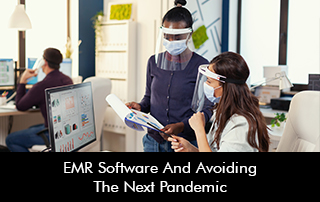Despite EMR Software being available at the time, the COVID-19 pandemic unleashed unprecedented devastation on a global scale, fundamentally altering our way of life and leaving an indelible mark on public health. Even as we emerge from the acute phase of the crisis, the lingering effects continue to impact millions worldwide.
Long COVID, a complex condition characterized by persistent symptoms following initial infection, affects an estimated 65 million people globally. In the United States alone, approximately 16 million working-age adults are grappling with long COVID symptoms. These individuals face a range of debilitating issues, from chronic fatigue and cognitive impairment to respiratory difficulties and cardiovascular complications.
The economic toll of long COVID is staggering, with an estimated $3.7 trillion in lost output due to reduced labor force participation. Beyond the numbers, countless personal stories highlight the profound impact on quality of life, mental health, and overall well-being.
As we reflect on the lessons learned from COVID-19, it’s clear that proactive measures and robust healthcare infrastructure are crucial in mitigating future pandemics. One powerful tool at our disposal is Electronic Medical Records (EMR) software, which has the potential to revolutionize public health surveillance and pandemic response.
EMR Software: A Cornerstone of Public Health Surveillance
Electronic Medical Records systems offer a wealth of data that can be leveraged to track health concerns at a broader public health level. By aggregating and analyzing patient information across diverse populations, EMR software can provide invaluable insights into emerging health trends and potential outbreaks.
Real-time Disease Surveillance
EMR systems enable real-time monitoring of disease patterns and anomalies. By continuously analyzing patient data, these platforms can detect unusual clusters of symptoms or diagnoses that may signal the emergence of a new pathogen. This early warning capability is crucial for rapid response and containment efforts.
Population Health Management
Electronic Health Records (EHR) software facilitates comprehensive population health management. By analyzing data on demographics, medical histories, and social determinants of health, public health officials can identify vulnerable populations and tailor interventions accordingly.
EMR Software and Predictive Analytics
Advanced EMR solutions incorporate predictive analytics to forecast disease trends and potential hotspots. By leveraging artificial intelligence and machine learning algorithms, these systems can anticipate outbreaks and guide resource allocation for maximum impact.
Interoperability and Data Sharing
Modern Electronic Medical Record platforms prioritize interoperability, allowing seamless data exchange between healthcare providers, public health agencies, and research institutions. This enhanced connectivity enables a more coordinated and effective response to emerging health threats.
Practical Preventative Measures Enabled by EMR Software
Beyond surveillance, EMR software empowers healthcare providers and public health officials to implement proactive measures that can significantly reduce the risk of future pandemics.
Automated Screening and Risk Assessment
EMR systems can be programmed to automatically flag patients with potential risk factors or symptoms associated with emerging infectious diseases. This feature enables healthcare providers to conduct targeted screenings and implement preventive measures promptly.
Vaccine and Immunization Tracking
Electronic Health Record software streamlines vaccine management and immunization tracking. By maintaining comprehensive records of vaccination status across populations, healthcare systems can identify gaps in coverage and implement targeted immunization campaigns.
Contact Tracing and Exposure Notification
In the event of an outbreak, EMR platforms can facilitate rapid contact tracing efforts. By leveraging patient data and integrating with exposure notification systems, public health officials can quickly identify and isolate potentially infected individuals.
EMR Software Telemedicine Integration
Many EMR solutions now incorporate telemedicine capabilities, allowing for remote consultations and monitoring. This feature reduces the risk of disease transmission in healthcare settings while ensuring continuity of care during public health emergencies.
Public Health Reporting and Data Analytics
Electronic Medical Records systems can automate the reporting of notifiable diseases to public health agencies. This streamlined process ensures timely and accurate data collection, enabling more effective disease surveillance and response strategies.
EMR Software Clinical Decision Support
EMR software can provide healthcare providers with up-to-date clinical guidelines and decision-support tools. This feature ensures that patients receive evidence-based care aligned with the latest public health recommendations.
Health Education and Patient Engagement
Many Electronic Health Record platforms include patient portals and educational resources. These tools can be leveraged to disseminate critical health information, promote preventive behaviors, and enhance overall health literacy among populations.
As we navigate the post-COVID landscape, the role of EMR software in safeguarding public health cannot be overstated. By harnessing the power of data, connectivity, and advanced analytics, these systems offer a formidable defense against future pandemics.
However, realizing the full potential of EMR technology requires ongoing investment, collaboration, and a commitment to data privacy and security. As healthcare providers, policymakers, and technology developers work together to refine and expand these systems, we move closer to a future where emerging health threats can be detected and contained before they escalate into global crises.
The COVID-19 pandemic has taught us the high cost of unpreparedness. By leveraging EMR software and embracing a proactive approach to public health, we can build a more resilient healthcare ecosystem capable of withstanding future challenges and safeguarding the well-being of communities worldwide.







